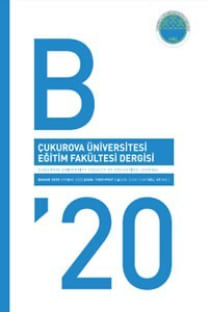THE EFFECTS OF LANGUAGE SIMILARITIES ON TURKISH LEARNING PROCESSES OF STUDENTS FROM THE BALKAN COUNTRIES
Öz
Interactions between Turkish and Balkan languages began with Hun raids to Europe and reached a peak level during the Ottoman Period. Even though Balkan languages and Turkish belong to different language families, similarities exist between these languages along with many common words (cognates). This is because these nations shared the same political system from the 14th century until 1912, and have had common or similar cultures up to now, influencing each other in all aspects of life. As language is a living entity shaped by culture, it is inevitable for cultural interactions resulting from centuries of co-existence to be reflected in language.The purpose of the study is to determine the effects of the similarities between Turkish and Balkan languages on Turkish-learning processes of students from Balkan countries and on their attitude towards Turkish. The study was conducted on a group of students with Balkan nationalities learning Turkish at Istanbul University Language Center. The data was obtained by means of “The Scale of Attitude to Turkish” which was designed by the researcher. In addition, the students involved were individually interviewed so as to determine to what extent similarities between their native languages and Turkish affect their Turkish learning process. It is thought that the results of the study will provide facilitating clues not only for students coming to Turkey from Balkan countries and learning Turkish but also for instructers teaching Turkish.
Anahtar Kelimeler:
Balkan languages, teaching Turkish, language similarities, attitude to Turkish
___
Aksan, D. (1995). Her Yönüyle Dil Ana Çizgileriyle Dilbilim, Ankara: TDK Yayınları.Briem, H. (1974). Development of an Instrument to Measure Attitudes toward the Study of Foreign Languages, (Unpublished Doctoral Dissertation), University of Michigan, Ann Arbor.
Chambers, G. N. (1999). Motivating Language Learners, Clevedon, Multilingual Matters.
Corbin S.S.; Chiachiere, F.J. (1995). “Validity and Reliability of a Scale Measuring Attitudes toward Foreign Language”, Educational and Psychological Measurement, Vol. 55: 258-267.
Gardner, R. C. (1985). Social Psychology and Second Language Learning: The Role of Attitudes and Motivation, London: Edward Arnold.
Gardner, R.C.; Lambert, W.E. (1972). Attitudes and Motivation in Second Language Learning, Rowley, MA: Newbury House.
Gülsevin, G. (2009). “Rumeli Türkçesi Çerçevesinde Türk ve Balkan Dillerinin Etkileşimi”, Turkish Studies International Periodical For the Languages, Literature and History of Turkish or Turkic Volume 4/8.
İnal, S.; Evin, İ. and Saracaloglu, A. S. (2005). The Relation between Students’Attitudes toward Foreign Language and Foreign Language Achievement. Dil Dergisi. 130: 37-52.
İsen, M. (1992). “Balkanlarda Değişen Sınırlar”, Türkiye Günlüğü, S.19: 90.
Kâğıtçıbaşı, Ç. (1992). İnsan ve İnsanlar, İstanbul: Evrim Basım Yayın Dağıtım.
Karaağaç, G. (2008). Türkçe Verintiler Sözlüğü, Ankara: TDK Yayınları.
Karasar, Niyazi (2003). Bilimsel Araştırma Yöntemi, Ankara: Nobel Yayın Dağıtım.
Kıral, B.; Kıral, E. (2011). Karma Araştırma Yöntemi (Mixed Research Design), 2nd International Conference on New Trends in Education and Their Implications 27-29 April, Antalya-Turkey.
Lado, R. (1957). Linguistics Across Cultures: Applied Linguistics for Language Teachers, Michigan: The University of Michigan Press.
Shah, P. (1999). Low Achievement Among Malaysian English Language Students: Perceptions of Experience, 4th CULI International Conference, Bangkok.
Starks, D.; Paltridge, B. (1996). A Note on Using Sociolinguistic Methods to Study non-Native Attitudes towards English. World Englishes, 15 2, 217-224.
Şefikoğlu, İ. M. (1987). “Kosova’da Kullanılan Arnavut ve Sırp Atasözlerinde Türkçe Kelimeler”, Beşinci Milletler Arası Türkoloji Kongresi Tebliğler I. Türk Dili Cilt 2, İstanbul: İstanbul Üniversitesi Yay.
Thadphoothoon, J. (1999). Effects of Attitude towards Studying English, English Experience from Media, and Study Habits on English Achievement: Selected Psychological and Behavioral Determinants of EFL Students’ Achievement: Perspectives and Analyses. From http://www.thinkblade.com/memletics/105/englishexperience-learning.html-15k.
Ülgen, G. (1994). Eğitim Psikolojisi: Kavramlar, İlkeler, Yöntemler, Kuramlar ve Uygulamalar, Ankara: Lazer Ofset Matbaa.
- ISSN: 1302-9967
- Yayın Aralığı: Yılda 3 Sayı
- Başlangıç: 2000
- Yayıncı: Çukurova Üniversitesi Matbaası
Sayıdaki Diğer Makaleler
THE ROLE OF TEACHER ATTITUDE IN PRESCHOOL LANGUAGE EDUCATION
DIE FUNKTIONEN DER AUFFORDERUNGSSÄTZE IN DER TÜRKISCHEN ALLTAGSSPRACHE
RELATIONSHIP BETWEEN THE LEADERSHIP BEHAVIORS AND ORGANIZATIONAL TRUST AND ORGANIZATIONAL JUSTICE
Kürşad YILMAZ, Yahya ALTINKURT
CYBER BULLYING, CYBER VICTIMIZATION AND PSYCHOLOGICAL SYMPTOMS: A STUDY IN ADOLESCENTS
Mustafa ŞAHİN, Betul AYDIN, Serkan SARI
AN EVALUATION OF GERMAN STUDENT TEACHERS WITHIN THE CONTEXT OF LEARNER AUTONOMY
